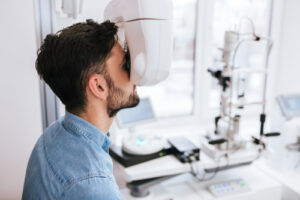Posted by: Manhattan LASIK Center
Most people want to stay healthy, especially as they get older. Leading a healthy lifestyle is vital to living a long life.
But leading a healthy lifestyle doesn’t only help you live longer. It can also help you keep your vision for longer.
Many older adults experience vision loss due to various common age-related conditions, which cause irreversible damage to vital parts of the eye. But keeping your eyes healthy can ensure you keep your vision even later in life. Keep reading for a few tips from our Ivy-League trained doctors.
Know Your Risk for Eye Disease
The first step in preventing vision loss from eye disease is to stay informed about eye conditions and your risk for age-related eye conditions. You can assess your risk by talking to your eye doctor and disclosing your medical and family history of eye disease.
When your eye doctor knows your risk, they can tell you how often you should have your eyes examined to spot any signs of eye disease early. Common eye conditions like glaucoma, macular degeneration, and diabetic retinopathy don’t present symptoms until vision loss has already occurred.
At that point, the damage is irreversible. But you can diagnose and detect these conditions before symptoms present themselves with comprehensive eye exams. You can treat these conditions to slow their progression and save your remaining vision.
Sunglasses Can Save Your Vision

UV light does more than affect your skin. It also affects your eyes.
UV damage to the eyes can increase your risk for common eye conditions like cataracts and even eye cancer. Just as you should wear sunscreen to protect your skin, you should also wear sunglasses to protect your eyes while driving or outside for an extended period.
Not all sunglasses protect your eyes, though. Some don’t have lenses that are tinted enough.
To make sure your sunglasses provide enough protection, look for a sticker or tag when you buy them that says “blocks out 99% of UV rays.” If your sunglasses have this tag, you can feel good about protecting your eyes while outside in the sun.
Stay Active
Being active and exercising is good for your whole body. A sedentary lifestyle puts you at greater risk for heart disease, high blood pressure, and diabetes.

These conditions also raise your risk for various eye diseases. The best way to avoid these conditions altogether is to stay active.
But getting exercise doesn’t have to mean going to the gym daily. Even walking a few times a week is excellent for your health.
If staying active is difficult for you, don’t try to start an extensive fitness routine that can be hard to stick to. Instead, focus on making little changes at first.
These can include taking the stairs instead of the elevator and getting up to walk around while working. The slower you ease into fitness, the more likely you’ll be able to stick with it.
Eat a Balanced Diet

In addition to exercise, a healthy diet can help prevent heart disease, high blood pressure, diabetes, and other conditions associated with poor nutrition. Some nutrients are especially good for keeping your eyes healthy.
Omega-3 fatty acids are excellent for your eye health, aiding in tear production. Since dry eye syndrome is common, especially in older adults, maintaining quality tear production is very important.
You can find omega-3 fatty acids in fish, walnuts, and various seeds. You can also take fish oil pills or flaxseed pills, although nutrients are absorbed more quickly from the food source.
Eating a varied diet that includes omega-3 fatty acids and nutritious, fibrous produce like dark, leafy greens can help keep you and your eyes healthy.
Limit Screen Time
Digital screens emit blue light, which can be harmful to your eyes. Overexposure can cause headaches, eye strain, dry eyes, and fatigue.
It can be challenging to limit screen usage if you work on a computer, but you can follow the 20-20-20 rule to reduce strain on your eyes. This rule states that after 20 minutes of looking at a screen, you should take a 20-second break to look at an object 20 feet away.
Taking a short break every 20 minutes will let your eyes rest and refocus briefly. It also reminds you to blink.
You can also switch your phone or computer to a “warm light” mode that reduces the amount of blue light the screen emits. Even if you’re not working, do your best to limit how much time you spend looking at screens, like your phone or TV.
See Your Eye Doctor Regularly and As Needed

Regular eye exams are a vital part of detecting and treating eye conditions. Schedule eye exams no matter how old you are.
Their frequency will increase as you get older. After you turn 40, you should have one at least every two years. After you turn 55, you should have one at least every year.
If you’re at higher risk for certain conditions, your ophthalmologist may recommend seeing them more frequently at an earlier age. It’s also important to see your eye doctor if you experience any persistent visual problems or eye discomfort.
These can be the early signs of eye disease, and you should have them looked at right away. Even if the issue is minor, like dry eyes, prompt treatment can still potentially save your vision, as even dry eye syndrome can eventually lead to vision loss when left untreated.
The key to healthy eyes is leading a healthy lifestyle and communication with your eye doctor. Making your eyes a priority will help ensure your vision stays crisp and clear for many years.
Do you have questions about eye health? Schedule an appointment at Manhattan LASIK Center in Westchester, NY, and get the answers you need from our team of expert ophthalmologists!

